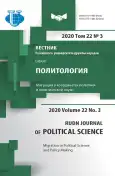New Right-Wing Populism: Tendencies and Prospects on the Example of Some European States (Italy, France, Germany, Austria)
- Authors: Sigachev M.I.1, Sleptsov E.S.1, Fadeev E.V.1
-
Affiliations:
- Primakov National Research Institute of World Economy and International Relations (IMEMO), Russian Academy of Sciences
- Issue: Vol 22, No 3 (2020)
- Pages: 458-474
- Section: MIGRATION AND POLITICAL TRANSFORMATIONS IN EUROPE
- URL: https://journal-vniispk.ru/2313-1438/article/view/322175
- DOI: https://doi.org/10.22363/2313-1438-2020-22-3-458-474
- ID: 322175
Cite item
Full Text
Abstract
The article reveals the relationship between the political crises that affected the European Union from 2015 to 2020, and the growing sympathy of voters for populist-Eurosceptic parties. Particular attention is paid to the political situation in Austria, where in 2017-2019. The government included right-wing populists, as well as the results of the European Parliament elections in May 2019, which testify to the strengthening of the position of a new populism, especially the right-wing one, represented by the Eurosceptics group “Identity and Democracy”. The purpose of the article is to analyze the current state of the right-wing populist parties and to describe the current patterns of their development in terms of political prospects and the impact on the internal politics of the EU member states. The following research questions are formulated: 1. “Has the influence of right-wing populist parties intensified or waned during the migration crisis?” 2. “Do right-wing populists constitute a coherent pan-European political force?” 3. “What is the specificity of Italian, Austrian and German right-wing populists?”. To answer these questions, a quantitative (first of all, thematic literature and publications in the media) and quantitative analysis (dynamics of relevant statistical information was evaluated). As a result of the study, the authors come to the following conclusions: 1. The entry of the Austrian right-wing populists (APS) into a coalition with S. Kurtz in 2017-2019. - This is part of the regular fluctuations in the balance of power between the three political “camps” inside Austria, and not a sharp turnaround in established political models (right turn). 2. The German right-wing populists, on the contrary, despite local and really sudden successes (AdG), are in systemic isolation. 3. In Italy, right-wing populists have made significant progress, but the prospects for their unity with other European new right-wingers remain controversial. 4. With some caution, it can be stated that the period 2017-2019, was successful for right-wing populists. The recognition of the right-wing populist parties, their media coverage and presence in government has increased markedly. The perception of the importance of migration themes and cultural identity has increased in comparison with the first half of the 2010s. Moreover, in 2020. this trend is beginning to decline, the themes of culture and migration are gradually giving way to topics of safety, health and the environment.
About the authors
Maxim I. Sigachev
Primakov National Research Institute of World Economy and International Relations (IMEMO), Russian Academy of Sciences
Author for correspondence.
Email: maxsig@mail.ru
PhD of Political Science, Junior Research Fellow
23 Profsoyusnaya St, Moscow, 117997, Russian FederationErnest S. Sleptsov
Primakov National Research Institute of World Economy and International Relations (IMEMO), Russian Academy of Sciences
Email: ernest89@mail.ru
Postgraduate Student
23 Profsoyusnaya St, Moscow, 117997, Russian FederationEduard V. Fadeev
Email: fadeeveduard@gmail.com
Independent Expert in Political Studies
References
- Kazarinova D.B., De Luca G. Migration in the Italian political discourse: the experience of empirical analysis. World Economy and International Relations. 2020. Vol. 64 (2): 90–99. (In Russ.).
- Malakhov V.S. Global governance in the field of migration: theory, institutions, politics. World Economy and International Relations. 2019.Vol. 63 (10): 89–96. (In Russ.).
- Kagarlitsky B.Y. Between Class and Discourse. How Left Intellectuals Serve Capitalism. M.; 2017. (In Russ.).
- Fromm E. Healthy Society. M.; 2005. (In Russ.).
- Ehnis P., Voigt K. Fromm’s Contribution the Analysis and Critique of the Ongoing Rise of Right-Wing Movements. Fromm Forum; 23: 138–152.
- Oskolkov P.V., Kharkevich M.V., Muzalevsky V.A. Archaism and the Contemporary Right-Wing Populism in Europe. Contemporary Europe. 2018. Vol. 1: 59–68. (In Russ.).
- Tevdoy-Burmuli A.I. Right-wing radicalism in Europe. Contemporary Europe. 2005, No. 4: 87–94. (In Russ.).
- Plasseraud Y. The identity of the peoples of Europe / trans. with French. A. Pondopulo. M.; SPb; 2019. (In Russ.).
- Collyer M., De Haas H. Developing dynamic categorisations of transit migration. Population, Space and Place. 2012. Vol. 18 (6): 468–481.
- King R., Lulle A. Research on Migration: Facing Realities and Maximising Opportunities. A Policy Review. Luxembourg, Publications Office of the European Union. 2016: 29. DOI: https://doi.org/10.2777/414370
- Tsapenko I.P. Promising technologies for the integration of migrants. World Economy and International Relations. 2019. Vol. 63 (10): 97–108. (In Russ.).
- Haerpfer C. National Council elections and electoral behaviour since 1945. In: Gerlich P., Müller W. Austrian parties since 1945: between coalition and competition, Wilhelm Braumüller Universitäts-Verlagsbuchhandlung. 1983. (In Germ.).
- Ucakar K., Gschiegl S. The Political System: Austria and the EU. Fakultas Verlag; 2010. (In Germ.).
- Perching B. “Immigration and integration policy”. In: Talos E. Black and blue: a Billanz of “re-governing”. Lit Verlag; 2006. (In Germ.).
- Rivera E., Davis M., Bunevich D. “Identity and Democracy”: ultra-right in the European Parliament. M.: Institute for Foreign Policy Studies and Initiatives; 2019. (In Russ.).
Supplementary files









